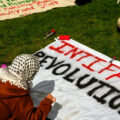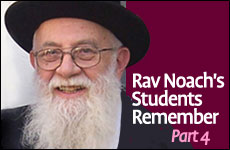 To The Protesters in America Calling for an Intifada
To The Protesters in America Calling for an Intifada


7 min read
Refugee of the Sixties, and doing something for Gilad.
Refugee of the Sixties
By Martin Hoffman
I met him in the winter of 1976 when Aish HaTorah had less than 30 students. Myself, depressed and disgusted with life, on the run from the bitter Vermont winters I had grown up with. Wandering around The Wall, wondering what to do with myself, I am accosted by Rav Meir Shuster with a question: "Would you like to meet a Jewish philosopher?"
Would I?
I am a refugee of the sixties -- Haight Ashbury, Sergeant Pepper, the incredible euphoria of those days that crashed so heavily. I am a refugee of the Institute of Islamic Studies, McGill University where I had a desk and a window on the top floor overlooking a glittering Montreal, and a fabulous fellowship to disperse all financial concerns -- that too, crashing down on me with the political bickering, back-stabbing, hatred of Jews that plagued the Institute. I am a refugee of a year-long trek across the globe, through Europe, Turkey, Iran, Afghanistan (on horseback), Pakistan and India, chasing the winds, the images, the perverse rhythms of my heart.
I am ushered, that winter day, into the office of Rav Noach Weinberg; myself, a perfect product of American assimilation -- all its values, its prejudices presented full blown to the bearded man now seated before me.
Rav Noach asks me his classic question: "Are you living to eat, or eating to live, Handsome?"
I am drawn in by his warmth; yet I am also frightened by a sense that he has the power to explode those myths that I cherish.
What hit me, in those first few moments, was: This is not your ordinary rabbi, looking for a succulent congregation; this is someone to reckon with. I am drawn in by his voice, his posture, his warmth; yet I am also frightened by a sense that he has the power to explode those myths that I cherish. I flash on one my grandmother's sisters saying about me: "He's so American, you'd never know he's Jewish."
"Stay with us for a while, Handsome," Rav Noach says. "No obligation." Smiling, warm and open. Just me and him in this office, no visible threats, though I feel, deep inside, the twitch to cut and run: anti-Semitism runs through my veins, and Rav Noah knows it. The ice, like that on the frozen Vermont lakes, is hard to crack, but somehow, he eases me into the Yeshiva.
In that winter of '76, the Yeshiva had a dynamics, an urgency that rattled your mind and heart. Many of the students, also refugees from the sixties with the same frustrations, sorrows and desires. To be or not to be ...Jewish, with all that it implied; that was the question. To perform major surgery on your thinking, your behavior. Kosher? Shabbat? Hundreds upon hundreds of restrictions and guidelines that I had thought were primitive, obsolete, idiotic. How could I swallow such a package? Who was sane here?
The Rebbe invited me to lunch one day in his office. He did that to keep in touch with the students. Just him and me that afternoon, and the incredible view of the Old City. I remember the frustrations choking me: how was it possible to live that way? Chained to a million details in Jewish laws? I'd have to be nuts to buy that package and I was going to tell him so. But before I could say anything, he nodded at the view and said, "Look at that. Handsome ... it's all there."
"What?" I stared out the window.
"You got the Arabs, the Land, the Jewish people.... Make a great movie, wouldn't it?" And he laughed, and his laughter caught me and somehow freed me from all that internal strife. And if in that odd, unexpected remark of his, I got a flash of what he wanted; how real and necessary it was, and how much he needed me to bring it into being.
I remained in the Yeshiva long enough to make those critical changes in my thinking, and always I had the sense of having some special "protektsia" (inside connection) with Rav Noach which had its roots in that curious moment we had lunched together in his office -- as if the intertwined laughter had allowed us to discard the masks and see into and through one another. It wasn't just that he was "the Rebbe," possessor of Jewish Law and Jewish thought; he embodied and cherished the ironies of life, as though he were indeed a profound Jewish philosopher.
Something for Gilad
By Dinah Akierman
For the past three years I have been thinking about Gilad Shalit. At night, I imagine him cold, alone in the dark. When I eat, enjoy a conversation with a friend or a beautiful view, I can't help but think about him, and how he must long for his freedom and his family. I wonder: has he lost hope? His mind? What kind of conditions is he living under?
Aside from thinking about and praying for him there wasn't anything else I thought I could do. What else can I do? If the powers that be can't secure his release what power do I have? I never once thought that I can do anything that can really make a difference – until a few weeks ago that is.
Even after his death, Rav Noach has given me the courage to at least try to do something concrete for Gilad.
A few weeks ago Rav Noach Weinberg left this world, but even in his death he has left the power to inspire, empower and give me the courage to at least try to do something concrete for Gilad. It happened while watching one of the videos in JewishPathways.com series featuring Rav Noach. In it he says that, if we really want to do something we should undertake it, ask the Almighty for help and He will help us. We can't just leave it at, "What can I do?" and go on with our busy lives. If the Almighty helps us we can do anything.
It was then that I decided to not only have Gilad in my consciousness but to actualize my longing for him to be freed into something concrete. But how?
My idea came from a comment I remembered overhearing at an all women's gathering a week before Rav Noach passed away. I happened to walk by a woman who made a passing remark about the incredible female energy she felt in the theatre. I didn't know why I had to overhear that comment at the time but it gave me an idea while watching Rav Noach speak on the video a few weeks later.
What if I tap into this "female energy" globally every erev Shabbos during candle lighting time. Imagine the incredible power of our prayers for Gilad during this most auspicious time to connect and communicate to God. The more candles lit, the more light we can generate into this world which can in turn dispel the darkness that Gilad is experiencing and with the Almighty's help, set him free.
So this Shabbos and the many others to follow, as we light the candles and pray for the spiritual well being of our loved ones, let us storm the gates in Heaven with our heartfelt prayers for the release of Gilad Shalit. Let us beseech the Almighty for his speedy return by reciting our own personal prayer for Gilad.
Historically, great things have happened in the merit of Jewish women. "In the merit of righteous women, the Jews were redeemed from Egypt" (Talmud, Sotah 11b).
Let us not underestimate the power of our "female energy" and prayer. And may the merit of doing this also elevate Rav Noach's great soul. He has taught me that I can make a difference, big and small.
